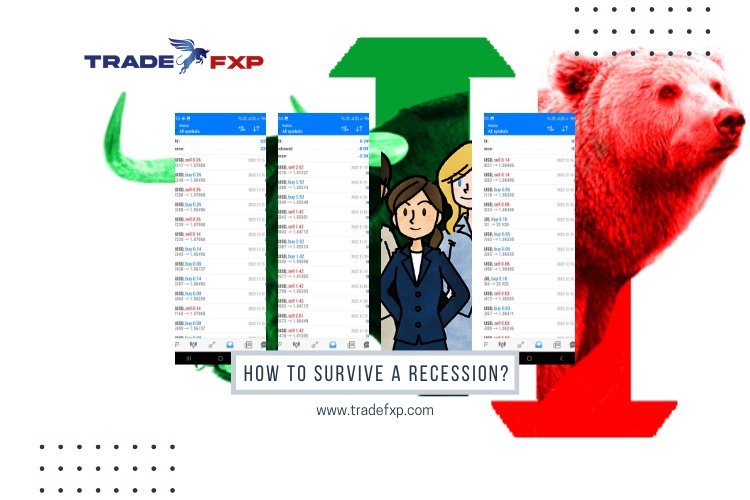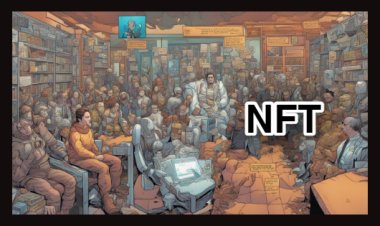How to survive a recession?
Learn effective strategies to withstand an economic downturn at Tradefxp's blog. Gain insights into finance management and recession-proof business practices.

Now that there is economic uncertainty, it is more important than ever to know how to survive a recession. There are steps you can take to survive a recession, whether you are worried about losing your job or your business. You can get through tough times by diversifying your income or cutting costs.
What is a recession?
Businesses often experience reduced demand for their products and services during a recession, which can lead to layoffs and decreased profitability during a recession, which typically lasts six months or longer. During a recession, individuals may also experience financial hardship, as job losses and lower wages can make it difficult to meet their basic needs.
The different types of recessions
There are four types of recession:
· Peak: A peak recession is when the economy is at its highest point before it starts to decline. This is usually followed by a trough.
· Trough: A tough recession is when the economy is at its lowest point. This is usually followed by a peak.
· Contraction: A contraction recession is when the economy shrinks for at least six months.
· Expansion: An expansion recession is when the economy grows for at least six months.
How to survive a recession financially
There are other ways to survive a recession financially, besides cutting back on spending.
Tips for surviving a recession financially include:
1. Make necessary changes to your expenses.
To survive a recession financially, you need to examine your expenses carefully and figure out where you can cut back. For example, if you often eat out, you might want to reduce this expense by cooking more meals at home. Also, cancel any memberships or subscriptions that you no longer use. When it comes to preserving cash during a recession, every wee speck helps.
2. Stick to your budget.
Budgeting is the key to surviving a recession financially. Use a budgeting app or spreadsheet to stalk your expenditures and comprehend the distinction between needs and wants.
3. Invest in yourself.
It is important to invest in yourself during times of recession. You may need to take courses or learn new skills to advance your career during this period. During tough times like these, it's also important to take care of your mental and physical health – invest in activities that make you feel good and keep your mind and body healthy.
What are the best industries during a recession?
Recession-proof industries differ according to different schools of thought.
The most stable industries in the economy, such as healthcare and food production, will continue to do well even when the economy is struggling, according to some. According to others, companies that offer affordable luxury goods or services, such as discount retailers or fast-casual restaurants, will thrive because people still want to treat themselves even on a tight budget.
When times are tough, I think that the best industries are those that provide innovative solutions to help people save money. A business that offers creative ways to cut costs without sacrificing quality could be anything from an app that helps you bargain shop to a company that offers creative ways to cut costs. It doesn't matter what industry you're in, if you can help people save money during tough times, you're likely to succeed.
How to seek work during a recession?
You can enhance your odds of discovering a job during a recession by doing some things.
Recessions often result in layoffs across industries, so it's important to be open to new opportunities during this time. Your resume should be up to date and tailored to the type of work you're looking for.
Make use of social media and networking. Use LinkedIn to connect with potential employers and let them know you're looking for work. Make sure your name is heard at enterprise events and demonstrations.
Finally, stay positive and keep searching until you find your perfect job. It may take longer than usual to find a job during a recession, but eventually, you will find one.
What causes a recession?
An economic recession typically lasts two consecutive quarters, as measured by the gross domestic product (GDP).
Many factors can lead to a recession, but demand-side factors and supply-side factors are the most common.
It is defined as a decrease in aggregate demand for goods and services in an economy caused by factors such as decreases in consumer expenditures, government expenditures, or investment expenditures. Businesses produce less when demand decreases, which leads to layoffs and reduced economic activity.
It refers to a decrease in the ability of businesses to produce goods and services as a result of supply-side factors. It can be caused by increased input costs (e.g., raw materials, energy), decreased productivity, or increased taxes and regulations. A decrease in supply leads to a decrease in production, which leads to layoffs and decreased economic activity for businesses.
How to know if a recession is arriving
Economic recessions are portrayed as prolonged plunges in economic activity. Generally, an economy enters a recession based on two technical indicators:
· A two- or more-quarter decline in real GDP.
· Long-term increases in unemployment.
Before a recession is officially declared, however, several warning signs can indicate its onset:
· Falling stock prices and market volatility.
· Increasing corporate layoffs and job losses.
· Rising interest rates and inflationary pressures.
· slowing economic growth and declining business confidence.
What to do after a recession
Here are some tips on what to do after a recession for businesses and individuals:
· Evaluate your business model and make necessary changes.
· Downsize your operations if necessary.
· Focus on cash flow and profitability.
· Invest in marketing and sales.
· Stay positive and adaptable.
Conclusion
In summary, it is important to have a recession emergency fund to take care of unforeseen expenditures.
Finally, try to bolster your income by taking on extra work or freelancing to weather any economic downturn. Those above are some tips for surviving an economic downturn.
To read more interesting articles CLICK HERE
To join our Hunter AutoBot Trading Program CLICK HERE



 admin
admin 










